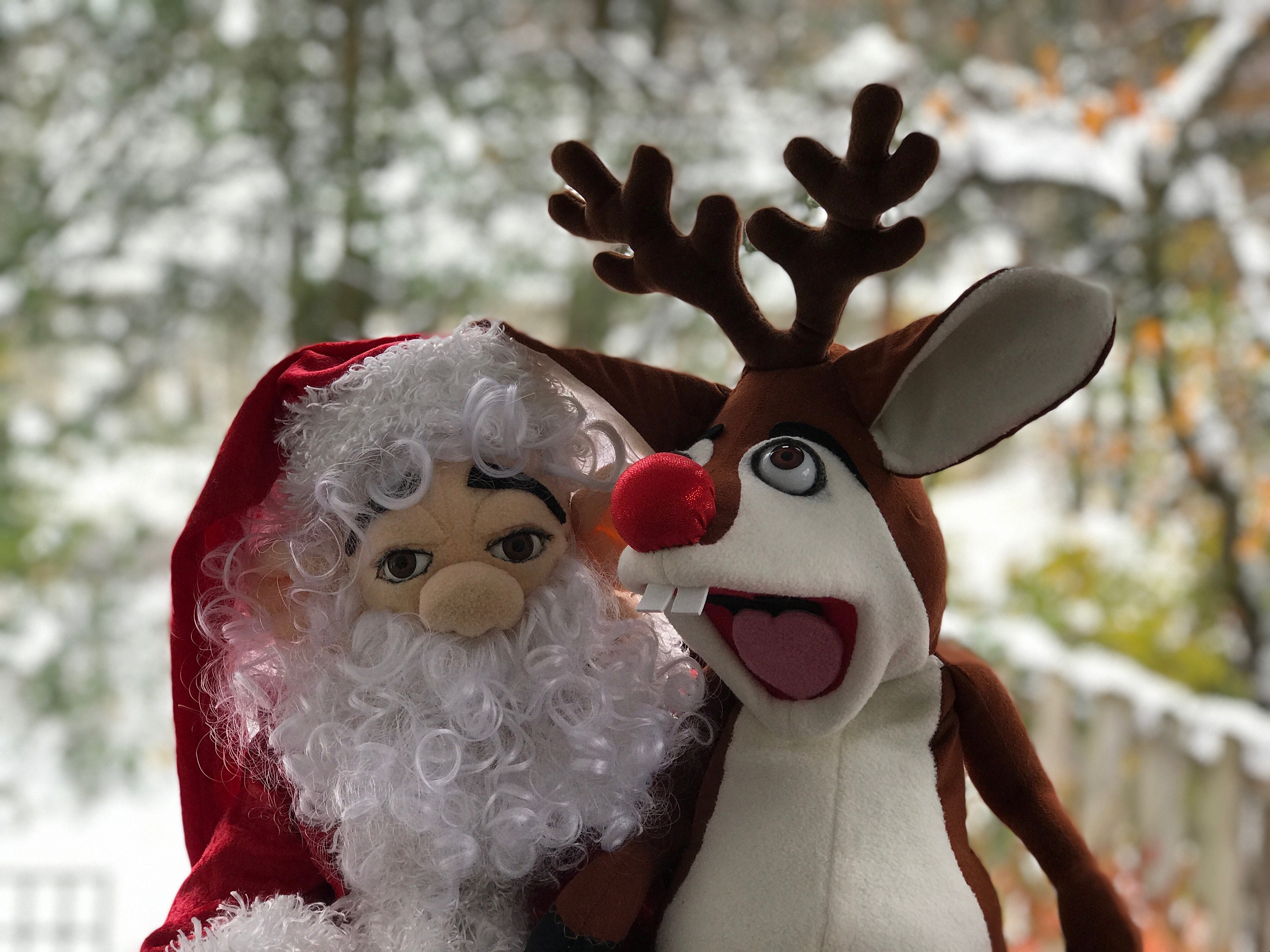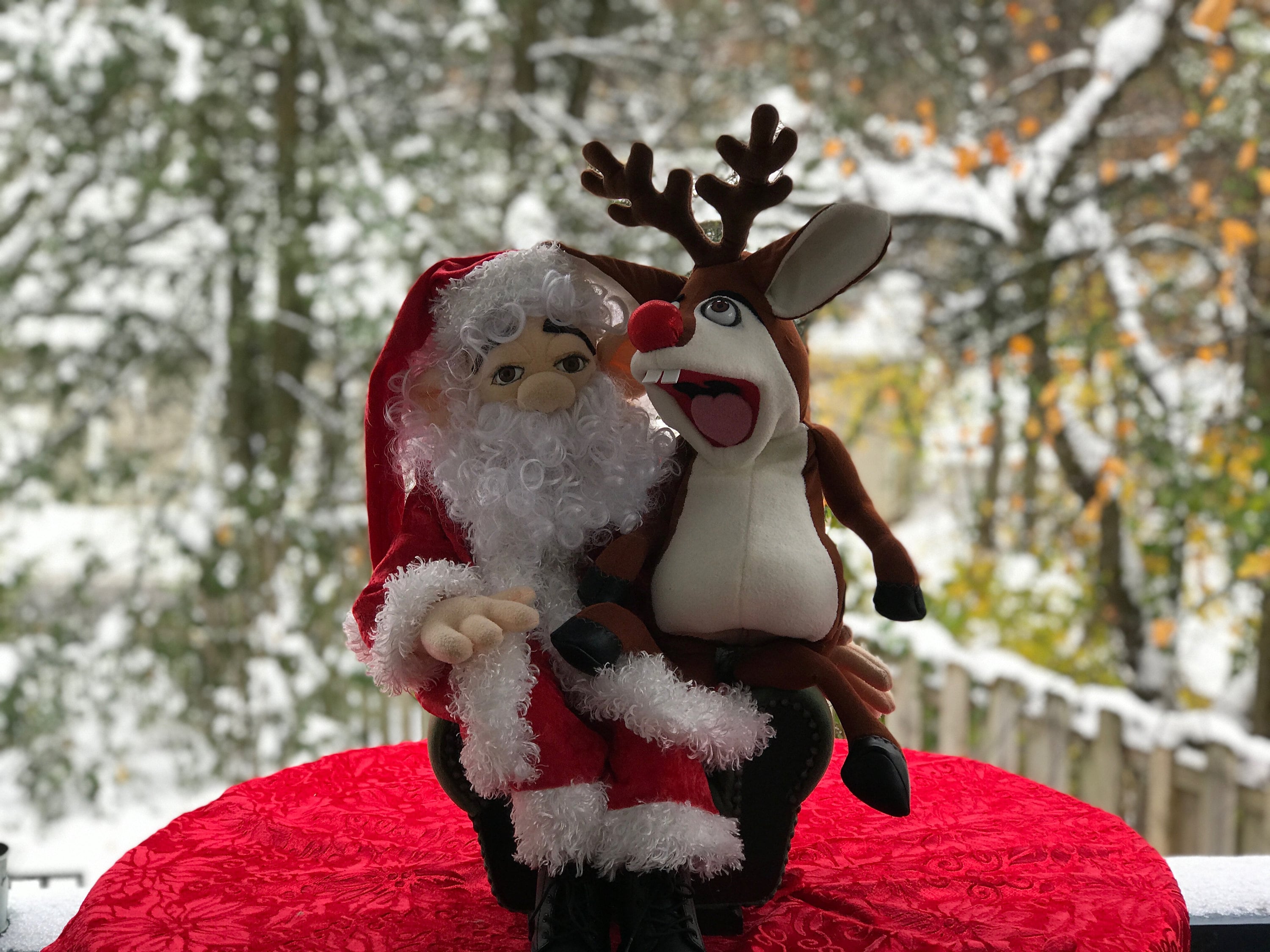Have you ever heard of the red hair angry puppet on Santa Clause? This peculiar character has sparked curiosity and intrigue among people of all ages. With its fiery red hair, fierce expression, and unique association with the jolly man in red, this puppet has become a symbol of festive folklore. Whether it’s part of a holiday story, a collector's item, or even a viral internet sensation, the red hair angry puppet on Santa Clause has captured imaginations worldwide. Its enigmatic presence raises questions about its origins, purpose, and the emotions it evokes during the holiday season.
While many associate Santa Clause with joy, generosity, and warmth, the red hair angry puppet introduces an unexpected twist to the narrative. Some believe it represents the duality of human emotions during the holidays—joy mingled with frustration or stress. Others view it as a humorous or satirical take on the commercialization of Christmas. Regardless of interpretation, this puppet has carved out a niche in festive traditions, inspiring debates, stories, and even merchandise. Its vibrant red hair and scowling face make it impossible to ignore, leaving us to wonder: What’s the story behind this unusual creation?
In this article, we’ll dive deep into the world of the red hair angry puppet on Santa Clause, exploring its origins, cultural significance, and the emotions it evokes. From its potential roots in holiday folklore to its modern-day interpretations, we’ll uncover the layers of meaning behind this fascinating figure. Along the way, we’ll answer burning questions like: Why is the puppet angry? How does it fit into the broader narrative of Santa Clause? And what lessons can we learn from its presence during the most wonderful time of the year? Get ready to embark on a journey that blends history, humor, and holiday cheer!
Read also:Miss Hannigan Character The Iconic Role That Defined A Generation
Table of Contents
- Biography of the Red Hair Angry Puppet
- What is the Origin of the Red Hair Angry Puppet on Santa Clause?
- How Does the Red Hair Angry Puppet Fit into Holiday Folklore?
- Why is the Puppet Angry and What Does it Symbolize?
- The Cultural Impact of the Red Hair Angry Puppet
- What Can We Learn from the Red Hair Angry Puppet?
- Red Hair Angry Puppet in Popular Media
- Frequently Asked Questions
Biography of the Red Hair Angry Puppet
Before delving into its cultural significance, let’s take a closer look at the red hair angry puppet itself. While it may not be a real person, its persona and story are worth exploring. Below is a table summarizing key "biographical" details of this unique figure:
| Attribute | Details |
|---|---|
| Name | Red Hair Angry Puppet |
| Associated Figure | Santa Clause |
| Appearance | Fiery red hair, scowling face, often depicted alongside Santa |
| Symbolism | Holiday stress, satire, emotional duality |
| Cultural Role | Folklore, humor, critique of commercialization |
What is the Origin of the Red Hair Angry Puppet on Santa Clause?
The origin of the red hair angry puppet on Santa Clause is shrouded in mystery. Some trace its roots to traditional holiday folklore, where it was used as a cautionary figure to remind children to behave. Others believe it emerged as a modern-day parody of Santa’s cheerful image. Let’s explore these possibilities in detail:
Traditional Folklore and Its Influence
In many cultures, holiday traditions include both benevolent and mischievous characters. For example, the German Krampus is a horned figure who punishes naughty children, contrasting with Saint Nicholas’s generosity. Could the red hair angry puppet be a similar character? Its fiery red hair and fierce expression suggest a connection to these ancient tales. Perhaps it was created to balance the overwhelmingly positive image of Santa, reminding us that even the happiest times can have their challenges.
A Modern Satirical Creation
On the other hand, the red hair angry puppet may have originated as a humorous critique of holiday commercialization. In recent years, the pressure to create a "perfect" Christmas has led to stress and frustration for many. This puppet could symbolize those feelings, serving as a reminder to embrace imperfection during the festive season. Its association with Santa Clause highlights the tension between idealized holiday cheer and real-world struggles.
How Does the Red Hair Angry Puppet Fit into Holiday Folklore?
Holiday folklore is rich with characters that embody different aspects of the season. The red hair angry puppet on Santa Clause fits into this tradition by representing the darker, more complex emotions that often accompany the holidays. Here’s how it aligns with other iconic figures:
Contrasting with Santa’s Cheerfulness
Santa Clause is synonymous with joy, kindness, and generosity. The red hair angry puppet, however, offers a counterpoint to this image. Its scowl and fiery demeanor remind us that not every moment of the holiday season is filled with cheer. This duality reflects the human experience, where happiness and frustration often coexist.
Read also:Bloomingdales Return Policy Your Complete Guide To Hasslefree Returns
Symbolizing the Pressure of Perfection
For many, the holidays come with immense pressure to create magical memories, buy the perfect gifts, and host flawless gatherings. The red hair angry puppet captures this tension, serving as a visual representation of holiday stress. Its presence in festive narratives encourages us to acknowledge and address these feelings rather than suppress them.
Why is the Puppet Angry and What Does it Symbolize?
The red hair angry puppet’s scowl raises an important question: Why is it angry? While there’s no definitive answer, several interpretations shed light on its symbolic meaning:
A Critique of Consumerism
One interpretation is that the puppet critiques the commercialization of Christmas. Its anger could stem from the overwhelming focus on materialism, which detracts from the true spirit of the season. By juxtaposing this figure with Santa Clause, creators may be encouraging viewers to reflect on their priorities during the holidays.
An Expression of Emotional Complexity
Another perspective is that the puppet embodies the emotional complexity of the holiday season. While it’s a time of joy and togetherness, it can also bring stress, loneliness, and frustration. The red hair angry puppet reminds us that it’s okay to feel a range of emotions and that these feelings are a natural part of the human experience.
The Cultural Impact of the Red Hair Angry Puppet
Over the years, the red hair angry puppet on Santa Clause has made its mark on popular culture. From memes to merchandise, its influence is undeniable. Here’s a closer look at its cultural impact:
Internet Memes and Viral Content
In the digital age, the red hair angry puppet has become a viral sensation. Memes featuring its scowling face often accompany humorous captions about holiday stress or family drama. These memes resonate with audiences because they capture relatable emotions in a lighthearted way.
Inspiring Creative Works
Artists, writers, and filmmakers have drawn inspiration from the red hair angry puppet, incorporating it into their work. Whether it’s a satirical short film or a whimsical children’s book, this figure continues to spark creativity and imagination.
What Can We Learn from the Red Hair Angry Puppet?
Despite its angry demeanor, the red hair angry puppet on Santa Clause offers valuable lessons. Here are a few takeaways:
Embrace Imperfection
The holidays don’t have to be perfect to be meaningful. The red hair angry puppet reminds us to let go of unrealistic expectations and focus on what truly matters—spending time with loved ones and creating lasting memories.
Acknowledge Your Emotions
It’s okay to feel frustrated or overwhelmed during the holidays. The puppet encourages us to acknowledge these emotions and find healthy ways to cope with them.
Red Hair Angry Puppet in Popular Media
From TV shows to social media, the red hair angry puppet has found its way into various forms of media. Its fiery red hair and scowling face make it an instantly recognizable figure, often used to add humor or commentary to holiday-themed content.
External Link
For more information on holiday folklore and its evolution over time, check out this resource.
Frequently Asked Questions
What is the significance of the red hair angry puppet on Santa Clause?
The red hair angry puppet symbolizes the emotional complexity of the holiday season, serving as a reminder that it’s okay to feel a range of emotions, from joy to frustration.
Where did the red hair angry puppet originate?
Its origins are unclear, but it may have roots in traditional holiday folklore or emerged as a modern-day critique of Christmas commercialization.
How can the red hair angry puppet help us during the holidays?
By acknowledging the stress and imperfections of the season, the puppet encourages us to embrace authenticity and prioritize meaningful connections over materialism.
Conclusion
The red hair angry puppet on Santa Clause is more than just a quirky holiday figure—it’s a symbol of emotional depth, cultural critique, and festive humor. Whether it’s reminding us to embrace imperfection or inspiring creative works, this puppet has left an indelible mark on the holiday season. As we celebrate the joy and magic of Christmas, let’s also remember to acknowledge the challenges and complexities that come with it. After all, it’s these moments of contrast that make the holidays truly special.

